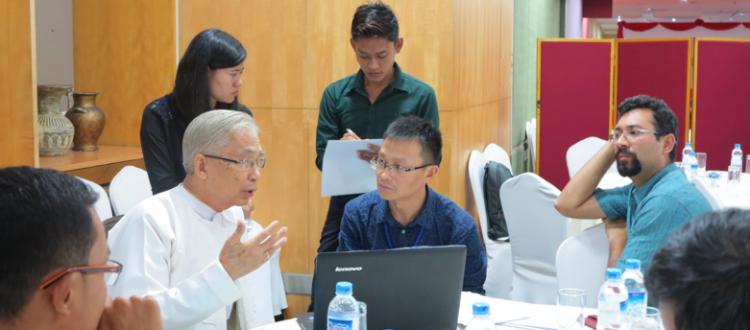Strengthening NGO Capacity in Myanmar
YANGON (October 16, 2016) – Myanmar’s astonishing economic growth in the past several years has put the country on the map as the fastest-growing economy in Southeast Asia. With its neighbors of China and India challenged by the socioeconomic and environmental impact of unchecked economic growth, Myanmar’s civil society leaders are determined for their country to follow a more sustainable path.

 GEI Executive Director JIN Jiaman and GEI Program manager Dr. Kui Peng discuss at the workshop (above); Participants enjoyed Dr. Peng’s creative presentation (below). – GEI 2016
GEI Executive Director JIN Jiaman and GEI Program manager Dr. Kui Peng discuss at the workshop (above); Participants enjoyed Dr. Peng’s creative presentation (below). – GEI 2016
This past weekend, the Global Environmental Institute (GEI), in partnership with the Myanmar Environment Innovation Foundation (MEIF), brought together local civil society groups, environmental non-governmental organizations (NGOs) and leading practitioners for a two-day “Project Management and Community Conservation & Development Practices: Learning and Sharing” workshop.
With the focus of this workshop on knowledge and experience sharing, activities included capacity building exercises and discussions on conservation and community development methodologies. GEI’s Executive Director Madame Jiaman Jin lauded this gathering as a “cornerstone of impactful development that compromises neither environmental conservation nor economic development, but rather is mutually benefiting for both sides.”
The workshop was attended by over 30 NGO leaders and representatives from the Myanmar Forestry Association, Ecosystem Conservation and Community Development Initiative (ECCDI), Myanmar Environmental Institute, and Community Development Action, whose innovation and leadership spanned across diverse fields, including environmental impact assessment (EIA), sustainable agriculture and agroforestry, and deforestation.
For many of these organizations, community development is a top priority: ECCDI emphasized that such progress is predicated on strengthening the inextricable “link between environmental solutions and poverty alleviation.”
Capacity Building for NGOs: Addressing Bottleneck Challenges
Conservation and Development Project Capacity
GEI shared over a decade of experience on how to address conservation without compromising – but rather improving – local livelihoods to be adapted in Myanmar. Opening the workshop, Jin remarked on GEI’s commitment to Myanmar’s sustainable future. Specifically referencing GEI’s work in developing sustainable timber trade and rural development projects, she shared her vision of fostering greater environmental cooperation between Myanmar and China.
Reflecting on these very ideas and principles, Dr. Kui Peng, Program Manager of the Environmental Conservation and Community Development Program at GEI, shared his insight on and experience with projects in western China. He emphasized the role of local people in enhancing and securing environmental protection, and equally significant, in reaping the benefits of these activities. To demonstrate this approach, he shared his ecosystems services-based model that has brought major success in addressing rural development and environmental protection in the grassland communities of Qinghai and Ningxia in China. As each group introduced their grassroots programs, sustainability and transferability became an echoing theme across their projects.
Community development draws a link between environmental solutions and poverty alleviation.

Environmental NGOs in Myanmar: Areas of Work

Representatives from the Myanmar NGOs speak about their projects – GEI 2016
Georgi Dzhartov, Myanmar Country Representative of the Group for the Environment, Renewable Energy and Solidarity (geres), an organization that delivers community development projects throughout Southeast Asia, observed and expressed concern over the lack of sustainability and ownership in many development projects. For many projects, he noted, there is a lack of an “exit” strategy, bereft of long-term sustainability and local ownership.
Following these sentiments, Chief Program Officer of S3IDF in India Avinash Krishnamurthy introduced financial mechanisms for these community development projects. Mr. Krishnamurthy further elaborated on the point of local capacity which needed to be strengthened on structural fronts and for beneficiaries.

Georgi Dzhartov, Avinash Krishnamurthy and Dr. Peng give their presentations. – GEI 2016
Administration and Communications Capacity Building
On the other side of development for civil society groups in Myanmar, internal organization capacity stands as an important focal point. Many of the Myanmar NGOs are small scale operations that seek greater organizational management. In order to scale up their work and disseminate their project impacts more effectively, these NGOs need to improve their financial management, grant writing abilities, and communications strategies. The GEI team led a sharing session on these three organizational skills, building off their own management experiences and communications practices as references.

(L-R): GEI’s Rongping Zhang, Kendall Bitonte and Lin Ji give their respective presentations on NGO management, communication and grant writing; below: a small group discussion delves deeper into workshop topics. – GEI 2016
Small Group Mentoring
To conclude the workshop, GEI offered a closed session facilitated by Mr. Krishnamurthy and Dr. Kui Peng. These two experts spoke with representatives of the four NGOs to more closely discuss challenges and work together to make new steps forward for future projects. Mr. Krishnamurthy and Dr. Peng asked individuals about specific problems and aspects of their project, in order to develop a more thorough understanding of their project designs. The NGO representatives also had the chance to clarify the mechanisms of revolving funds, sustainable solutions, business models, and local capacity building, to enhance later collaboration.

Dr. Peng and Mr. Krishnamurthy speak with the NGOs individually to find sustainable solutions for the community development. – GEI 2016
Mme. Jin considered these small group mentoring portion to be the most successful session in the entire workshop as it spurred critical dialogue between GEI and the NGOs that laid the groundwork for later exchanges.
Through this workshop, GEI demonstrated its invested interest in delivering bottom-up training to offer windows of opportunity and cooperation for a more prosperous and sustainable future.

